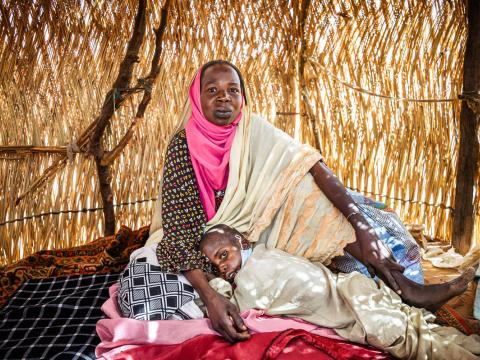Hunger and Sexual Violence at unprecedented levels in Sudan according to World Vision Report

- Fears that up to 65% of women in Sudan may be experiencing sexual violence, based on similar contexts.i
- 6.1 million Sudanese at risk of mental health disorder as a result of the conflictii
- Over half Sudan’s population now experiencing acute food insecurity as a result of conflict, with famine conditions confirmed in Zamzam displacement camp in North Darfuriii
NAIROBI (August 20, 2024) -- While the world’s attention is focused elsewhere, the conflict in Sudan has quietly triggered an unprecedented humanitarian crisis, especially for children, causing mass displacement, severe levels of hunger, deteriorating mental health, and an increase in gender-based violence, according to a new report released today by global humanitarian organization, World Vision.
In April 2023, conflict erupted in Sudan, plunging the country into disarray and inducing a humanitarian crisis of epic proportions. As we approach the 500th day of the conflict, the crisis only deepens. Children and their families are being forcibly displaced from one location to another as the front lines shift, creating the worst children’s displacement crisis in the world. Upwards of seven million children have fled violence in search of food, shelter, and safety – the majority internally displaced, while others have fled to neighboring countries.
The report, titled, Unprecedented hunger, mental health tragedy, and gender-based violence: The crisis for children and families in Sudan, reveals 26 million people in Sudan are expected to experience acute food insecurity, hunger and malnutrition as a direct result of the on-going conflict. This is over half of Sudan’s population and a figure comparable to almost the entire population of Australia. One million of these people are expected to face life-threatening famine-like conditions between October and December 2024. The report includes compelling stories from Sudanese people impacted by the war.
“Children are particularly affected by high rates of food insecurity and that is World Vision’s biggest concern in Sudan at the moment,” said John Makoni, National Director of World Vision Sudan. “Nationwide, four million children under the age of five are expected to experience hunger by the end of 2024, and 730,000 are projected to experience severe acute malnutrition. The world can’t turn a blind eye any longer; the time to act is now,” added Makoni.
Additionally, hunger and conflict are rapidly fuelling a mental health crisis that will affect children and families long after peace is restored. According to the report, an estimated 15.7 million children and their families impacted by the crisis in Sudan are at risk of mental disorders because of the interlinking crises of conflict and hunger. An estimated 1.4 million Sudanese projected to have severe mental illness after the conflict, will likely continue to struggle with hunger long after Sudan returns to stability.
“Recognizing the importance of mental health for resilience and recovery in crisis situations, World Vision is implementing mental health and psychosocial support programming, but the needs are greater than our resources,” said Phiona Koyiet, World Vision’s Senior Technical Advisor Mental Health and Psychosocial. “It’s not just about the immediate impacts either, but the long-term mental health impacts this crisis will have for a generation of Sudanese. An estimated 40% of people with severe mental illness are food insecure. Even after peace is restored, the people of Sudan will urgently need long term mental health and psychosocial support,” added Koyiet.
Deepening the crisis even further, World Vision’s report reveals millions of women and girls in Sudan are unsafe as sexual violence has been weaponised, targeting women’s and girls’ bodies as battlefields. The presence of armed actors, displacement, weakened social and protective networks, and insufficient access to services, create an environment where women and girls are at acute risk of gender-based violence and its harmful effects.
“We’re seeing reports that up to 65% of women in South Sudan experience intimate partner and/or sexual violence, a rate that is double the global average.iv Although we don’t have data for Sudan due to the conflict, we’re fearful that numbers are similar there. Communities are also more likely to resort to specific forms of gender-based violence, such as sexual exploitation and child marriage, to cope with insecurity and escalating humanitarian needs. It’s a very troubling trend that needs to be addressed immediately,” noted Koyiet.
“The significant shortfall of international support is unacceptable. The global neglect of Sudan is a searing indictment of failed international solidarity and foresight. The situation in Sudan, and subsequent refugee flows, threaten to overwhelm the entire East African region and beyond. The opportunity to turn the tide on this humanitarian crisis is rapidly closing and urgent concerted action is needed to protect the next generation of Sudanese children,” concluded Makoni.
ENDS.
Report available to download here
About World Vision
World Vision is a Christian humanitarian organization dedicated to working with children, families and their communities worldwide to reach their full potential by tackling the causes of poverty and injustice. World Vision serves all people, regardless of religion, race, ethnicity or gender. For more information, please visit worldvision.org or follow on X, formerly known as Twitter, @WorldVisionUSA.